When her friend Greg heard about her upbringing and suggested she write her memoir, Teressa took the idea seriously. It would take years of fits and starts—and developing a thick skin—for Teressa to get her book out in the world.
Tell us a little about your background.
I’m an Army brat and while growing up, we moved over a dozen times. So, I don’t have a hometown. We never stayed in any one place long enough for it to feel like home.
I was the middle child in a family of five: Dad (Jon), Mom (Lori), an older sister (Debi), and a younger sister, Karen. My siblings and I are about two years apart. Debi was born in Alaska, I was born in Kansas, and Karen in Germany.

With my sisters
Now, I live in Springfield, Illinois with Marc, my husband of nearly 40 years. We originally met in high school and then reconnected the summer before he began medical school, while I was attending college classes and working at a local bank. At the time, I had a three-year-old daughter (Heather) from a previous teenage marriage. Marc and I dated for six months before he proposed in December,1980. We married that spring.
Heather, who is now 43, is currently working for the state of Illinois as a Public Service Administrator. Heather, her husband (Sean), and our only grandchild (Caleb, 17) live in Springfield, too.
In addition to Heather, Marc and I have two boys: Cole and Matthew. Cole is 34 and lives in Scottsdale, Arizona. He has an MBA from Harvard and works as VP of Product Management at Aural Analytics. Matthew is 31 and owns a talent management company in Los Angeles called Stride Management.
Even though we are spread across the nation, we are a close-knit family that connects often.
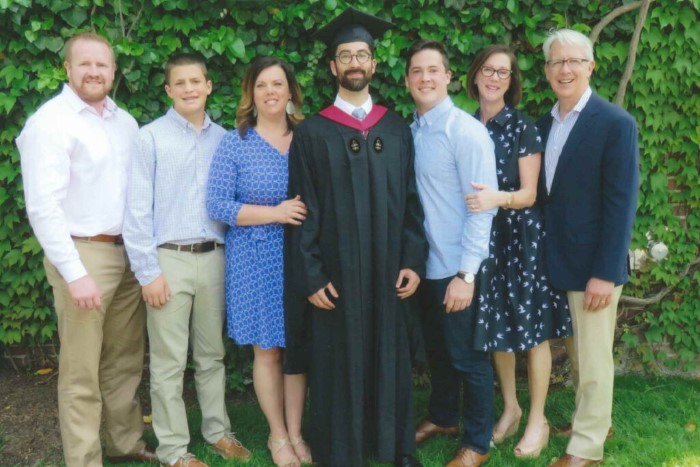
With our son at his Harvard MBA graduation
I graduated from Belmont University in Nashville, Tennessee in 1984 with a degree in Business Administration. My first job after college was as an Assistant Director of Admissions at George Peabody School for Teachers (now a part of Vanderbilt University). After two years, I took a job as the Business Manager of the Department of Orthopedics at Vanderbilt. I remained in medical practice management for the rest of my career, ending as the Director of Ambulatory Care, Administrative Services, at St. Louis University School of Medicine. In addition to managing the 12 sites where our physicians treated patients, I also was responsible for Outpatient Medical Records, Social Services, Quality Assurance, Building Management, and Medical School staff responsibilities such as Annual Clinical Department Reviews.

At work as Business Manager at Vanderbilt
When did you start to think about making a change?
I didn’t wake up one morning and say, “I think I’ll do something else. Maybe something creative.” Instead it happened over a long period of time. It was a 20-year journey. After I stopped working in medical practice management, I spent ten years thinking, reading, and taking notes and another ten writing and editing.
The idea first presented itself while Marc and I were on vacation in Jamaica with friends. After enjoying a couple of Red Stripes and a day of wading in the pool, my friend Greg began asking me questions about my childhood. He said, “I find it strange that you never talk about your family.”
Completely out of character, I answered his questions instead of diverting the conversation. After a few minutes, he said, “Gee whiz Teressa, that’s unbelievable. You can’t make this stuff up. You should think about writing a book.”

What is your next act?
At 61, I am the author of The Sergeant’s Daughter: A Memoir, which was recently published by She Writes Press. My book is a coming-of-age memoir about about growing up with an abusive father who was a sergeant in the Army. He physically and psychologically abused me and my two sisters but never laid a hand on my mother. She was complicit in his abuse, never intervening to protect us. When push came to shove, she always chose him. Though this context is rather grim, the book is about perseverance, grit, and determination. It’s about how through education and the love of friends, neighbors, and strangers, I was able to escape my home. Ultimately, I freed myself from the circumstances that shaped my childhood to build a beautiful and loving home for myself, my husband and my own children.
I wrote this memoir without any creative writing training or experience. Crazy, I know. And tormenting, agonizing, and frustrating, too. The best thing about writing the book is that I’ve finally finished it. It was the hardest thing I’ve ever done. But now that it’s behind me, I’m so glad I did. It was a cathartic process that helped me to let go of the shame that I felt as a child, the resentment towards my mother who never protected me, and the guilt I felt when I escaped home leaving my younger sister behind. I feel such a sense of relief. Carrying the secrets of my childhood abuse had been a heavy burden.
I’m also appreciative of the positive feedback I’ve gotten from women who have experienced a similar upbringing. Some have thanked me for having the courage to tell my story. It feels good to know that my book might help others.
One woman told me my book was the first book she’d read since high school. She said it was the first book her children had ever seen her read and that made her proud. She thanked me for making her want to read again and to read to her children. This comment alone made the long process worthwhile.
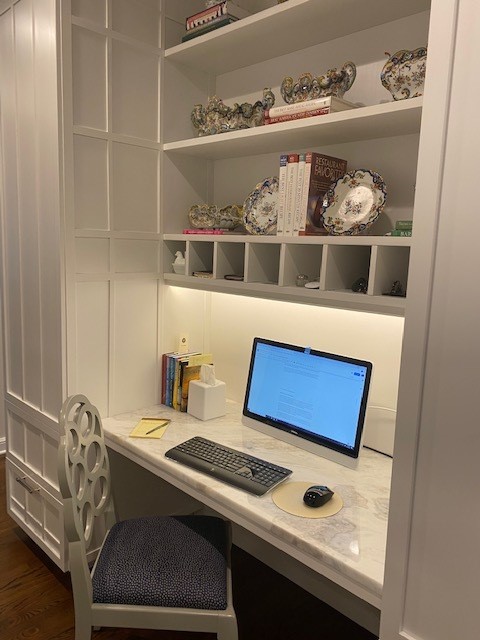
My writing space
How hard was it to take the plunge?
Just getting started proved to be the toughest part of taking the plunge. When I returned from vacation, I got a dozen yellow legal pads and sat down to begin writing. I started with what I knew: an outline annotated with questions, ideas, and lots of bullets. After months of working on this outline, I realized that I might just be adding bullets forever. The outline had turned into a procrastination tool. Enough was enough. It was time to start writing.
But trying to get words on the page paralyzed me. I’d sit in front of the computer for hours, laboring over every word. Even so, nothing I wrote was good enough. I’d spend a day writing a paragraph and then erase it. I tried to pump myself up. “Just get something down,” I told myself. “You can go back and fix it later.” But I was so caught up in how every sentence and paragraph fit within my outline that I had gotten myself stuck. I was trapped in a vicious cycle of write and erase. So, I just put the whole thing away in my desk.
A few years later I came back to it, only to battle with the outline once more. Every couple of years, I’d dig out the outline and attempt to write, but I always had the same outcome. Finally, my husband, Marc, helped me break the cycle. He told me, “Just tell your story.” And those four little words snapped me out of my rut.
This time, before I tried writing again, I prepared by reading. A lot. I thought of this as research. It may seem funny to propose research for a memoir. After all, who could be more of an expert on the subject of my life than me? But I wanted to familiarize myself with as many different approaches to the genre as possible. I read every new memoir I could get my hands on. And I returned to some of my old favorites like Angela’s Ashes, The Liars’ Club, The Glass Castle and Eat, Pray, Love.
While I read, I took notes on how the authors dealt with sensitive material, particularly domestic abuse, which was at the heart of my story. I also observed how they described love-hate family relationships, something that I also planned to write about. In other words, I read other memoirs not only because that was my genre, but also so I could get a sense of how to approach the parts of my story that I knew would be most difficult for me to tell. Then, once I started writing, I stopped reading. I wanted to make sure that my book was my own, informed by memoirists before me but not mimicking their work.
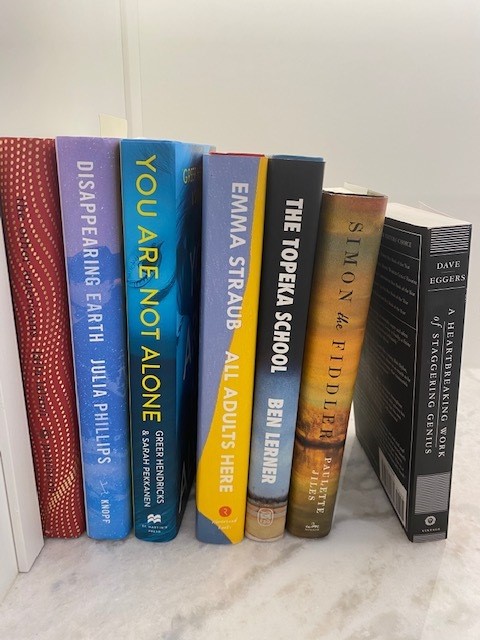
A few of my favorite books
How supportive were your family and friends?
When I told family and friends about the book, two camps quickly emerged. From one camp I heard things like: “You’re not an MFA or even an English major.” And “Real writers spend years studying and perfecting their craft.” And the one that really hit hard was, “Do you know that only an infinitesimal number of manuscripts actually get published?” Of course, I knew what they were saying was true, and that they were trying to protect me from getting my hopes up. But still it was hard to hear. Frankly, it hurt my feelings.
Camp Two told me the opposite. “I know you, Teressa,” they said. “You can do anything you set your mind to!” And “I’ll be so proud when I see it at the airport bookstore,” and “I can’t wait to read it and see the movie!”
My mother and oldest sister have passed away. I haven’t spoken to my father in over two years, but he knows I have been working on a book for some time. He’d often call and try and tell me what I could or could not write about. My sister is supportive, but honestly, I think she’d rather I did’nt share my story.
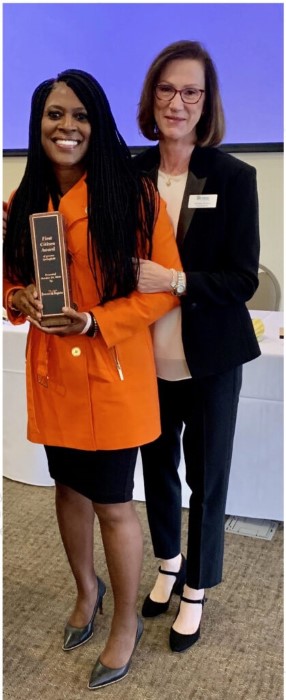
With a good friend who’d just won a service award
What challenges did you encounter?
One challenge I had was dealing with the constant questions from Camp Two. I hadn’t thought through my decision to tell family and friends that I was writing a book. I didn’t think about what I was getting myself into. As time passed, they’d ask, “When do you think you’ll be done with the book?” and “When can I read it?” Every time they asked, I was filled with anxiety. These were questions I was already asking myself. I often feared I’d never finish and that the years I’d spent writing would amount to little more than a huge waste of time. These questions from family and friends proved to be too much pressure. So much that I quit writing twice. When I started back up the third time, I didn’t tell anyone, not even my husband, that I was back at it.
Another challenge was the unrealistic writing schedule I’d planned for myself. When I started my book, I intended to finish the writing in a year. I didn’t think about how much this would require me to write each day. And I certainly didn’t account for editing. As the weeks and months passed, my overly ambitious timeline only added unnecessary stress to an already difficult process.
What did you learn about yourself through this process?
So much. First, I learned that Camp Two was right: I finish what I start. I can write. Even when it got hard, I kept going. Learning this about myself has given me a new confidence. The process taught me that I’m tough, determined, and resilient.
I also came to see these attributes in my younger self, the one who was surviving daily physical and emotional abuse. Writing the book, I also realized that I still carried many remnants of my past. I still had lots to process and “unpack.” I’m proud of myself for confronting my past and realizing that I’m giving, and loving, and the kind of parent I’d always wished for.

With my daughter Heather when she was 6 months old
Looking back, is there anything you’d have done differently?
When I was struggling to get the words on the page, I wished that I’d confided in my husband earlier. If I’d heard his advice sooner, I would have started by identifying one key story that I wanted to tell and write that. Rather than fretting that the story was out of sequence, or if it contributed to the story arc, character development, or theme, I would have concentrated on getting an anecdote down on paper. Freed from the press of The Book, I would have shown myself much earlier that I could, in fact, write. I think that small victory would have saved me a lot of agony.
I also wish I’d given myself a more realistic timeline by measuring my typical progress each week and accounting for my otherwise already busy schedule. And if only I’d known what the revision process would be like! I wasn’t prepared, nor did I understand, the number of times I would have to “touch” and “retouch” every single page of my book. Many times I said, “Okay, I’m done,” only to be told by a reviewer, my editor, or my publisher that there were more edits to make. Every one of those changes has made my book better. I just never anticipated that there would be so many of them!
What advice do you have for women seeking reinvention in midlife?
It’s so easy to find excuses not to make a change. Even if you want to.
For me, time was a big hurdle. When I began thinking about my book, my life felt like it was already filled to the brim. I was the wife of a busy physician, the mother of three active children, and the grandmother on call when my working daughter needed help with our young grandson. In addition, I was a member of the local school board and volunteered at my children’s schools, and at the Food Bank, Habitat for Humanity, and the Helping Hands shelter. How could I possibly find time to write a book?
I knew that I didn’t want reinvention to mean abandoning responsibilities that fulfilled me. So I started by making a list of all the things in my life that were non-negotiable, like helping and caring for my family. The harder question was what things was I willing to let go of? After much thought, what made sense was the School Board. I wouldn’t run for re-election. I’d already served two terms (8 years) and my youngest son would soon graduate from high school. It was time for someone who had children in the district to fill my spot. That didn’t make it any easier to let go of my spot. But giving it up freed up several hours a week, hours I could devote to my new project. Addressing this practical obstacle made reinvention possible.
I think that old saying is true: If you want it bad enough, you can find a way.

Volunteering
What advice do you have for those interested in writing a memoir?
I’ll share the best piece of advice I got: When I was working on my book, every author, agent, and publisher I spoke with told me that I had better have thick skin. They were right. From the beginning, I understood I’d have to steel myself before I showed my book to anyone in the industry. I knew the “negative” comments from Camp One were only the dress rehearsal.
A few years ago, after I completed a rough draft of my manuscript, I began looking for someone in the industry to do the fine tuning and edit my book. I wrote to a few prominent developmental editors and was thrilled when one agreed to read the manuscript. A week later I received an email from him. He told me my book was awful. “It’s so bad,” he wrote, “you need to put it in a box and shove it under your bed.” Even though I knew I was supposed to be tough, I listened to him. For months, that’s where my manuscript remained.
I couldn’t get his words out of my head. I played them over and over again. But every time I did, they stung a little bit less. Eventually I was even able to laugh and joke that the editor may have said shove it under the bed, but he didn’t say throw it away. I knew there was still hope.
Looking back, I can now see that harsh feedback helped. Because I was determined to prove it wrong, it emboldened me. Allow the criticism to feed you.

Promoting my book via Zoom
What resources do you recommend for would-be memoir writers?
As I mentioned earlier, I relied primarily on books. I read lots of memoirs, but also writing handbooks. Among them were:
Handling the Truth: On the Writing of Memoir by Beth Kephart: This book was my go-to reference book. Beth covered every aspect of writing a memoir.
Writing as a Way of Healing: How Telling Our Stories Transforms Our Lives by Louise Desalvo: From DeSalvo I learned how to use writing as a way to heal emotional and physical wounds. Just putting the words down on paper can give you peace.
Living to Tell the Tale: A Guide to Writing Memoir by Jane Taylor McDonnell: She provided specific techniques to help me discover my inner voice and to silence your inner censor.
Breaking Ground on Your Memoir: Craft, Inspiration, and Motivation for Memoir Writers by Brooke Warner and Linda Joy Myers. This book lays out in a very approachable way to start, organize, and get through the writing process. It also offers advice on how to avoid roadblocks along the way.
The Art of Memoir by Mary Karr. I found this book both engaging and encouraging. It’s a must-read for anyone thinking about writing a memoir.
I also worked with an editor, Maggie Taft before submitting my manuscripts to publishers. Maggie teaches in the Master Program in the Humanities at the University of Chicago and runs a writing center in Chicago called the Haddon Avenue Writing Institute, where she works mostly with practicing artists and designers. Memoir is a bit unusual for her, but we connected through a family friend and she was willing to take on the project. She helped me revise the manuscript, but also how to think about writing. She taught me how to be clearer and more succinct in my writing. Not only did she help improve my manuscript, I’m a better writer today because of her.
What’s next for you?
Honestly, I haven’t thought about what’s next. I’ve been so absorbed in my writing that I haven’t had time to think about it. Right now, I’m going to take a moment and enjoy and appreciate this accomplishment before I worry about what’s coming next.
Connect with Teressa Shelton:
Email: teressajshelton@gmail.com
Author profile: https://booksparks.com/portfolio/teressa-shelton/
The Sergeant’s Daughter: A Memoir
Facebook
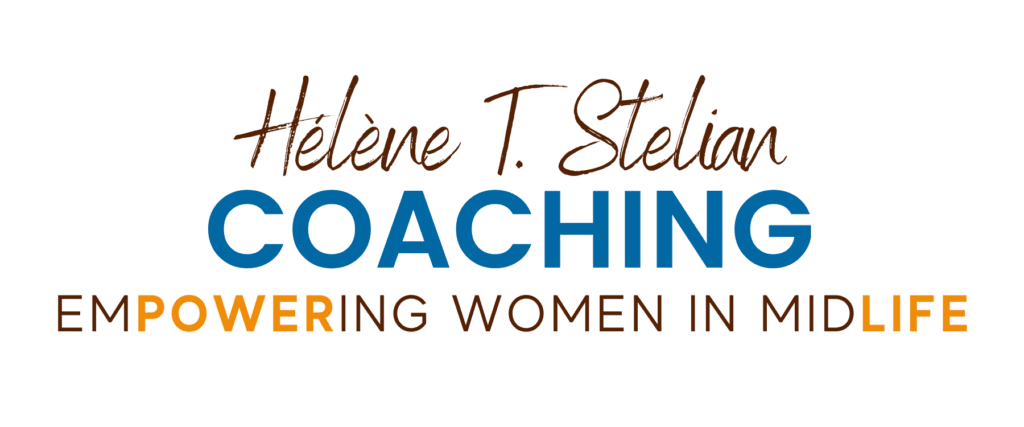

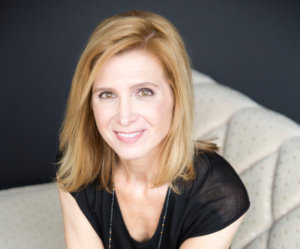




0 Comments
Trackbacks/Pingbacks